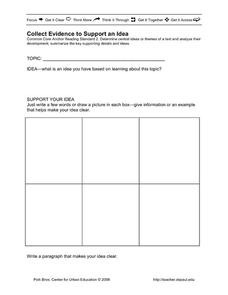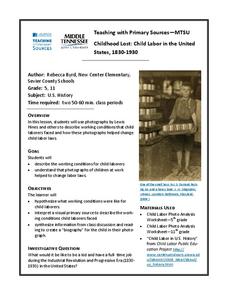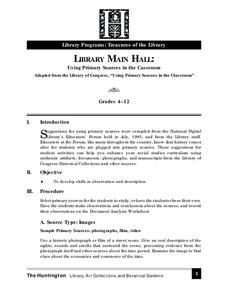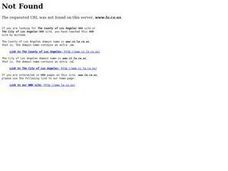Bright Hub Education
Using Evidence and Supporting Details in Writing
In expository writing, it is important to back up claims with evidence and details. Help your class to develop their writing with notes on different types of evidence. Once they have the basics down, practice with a sample thesis and...
Building Evidence-Based Arguments: Grade 9
New ReviewHigh schoolers investigate the dilemma of a proportional response with a lesson about the history of terrorism and militant extremists in the United States. As they examine memos from the FBI and speeches from President Bush and Obama,...
Polk Bros Foundation
Collect Evidence to Support an Idea
In order to support an idea, writers must use evidence. Your class members can prepare their evidence with this basic worksheet. Writers note down the topic they are learning about and their own idea. Next, they come up with information...
Literacy Design Collaborative
Using Textual Evidence to Analyze Literary Responses to Historical Events
Scholars analyze Animal Farm to learn how to add textual evidence into essays to support their ideas. They search for a deeper meaning to the story and how it relates to the text Totalitarianism and Revolutions in Russia. To finish,...
Curated OER
Is That a Fact?
Investigate popular scientific claims and gather evidence to defend or argue against an author's stance. Writers synthesize information and compose their own "Really?" columns modeled after those found in the weekly "Science Times"...
Curated OER
Arti-Factual Evidence
Practice responding to controversial information with the New York Times lesson provided here. Middle schoolers watch a video interview with the director of The Lost Tomb of Jesus. After reading a companion article, they identify the...
Curated OER
Hic-Hic-Hooray!
What is really the best way to get rid of hiccups? Investigate some old wives' tales and folk remedies related to health. Middle schoolers explore the science behind why people might believe these myths to be true and find the real...
EngageNY
Grade 9 ELA Module 4, Unit 1, Lesson 13
Class members conclude their reading of the supplemental text, “Bangladesh Factory Collapse: Who Really Pays for our Cheap Clothes?” and use the provided Evaluating Argument and Evidence Tool to analyze the evidence Anna McMullen uses to...
Alabama Learning Exchange
The Big Bang Theory: An Evidence-Based Argument
What evidence supports the big bang theory? Individuals analyze scholarly resources about the the theory and develop arguments backed by evidence. They brainstorm, share ideas, watch a video, and read articles to complete a graphic...
Curated OER
Introducing Jane Eyre
"How can a magazine reflect a particular time and culture?" Using this prompt, your class explores the Victorian Era as it relates to Charlotte Bronte's Jane Eyre. They can also play the "Victorian Women's Rights" game for the year 1840...
Curated OER
The Effects of Slavery
The emotional and spiritual oppression of slavery in the African-American experience is the focus of this lesson. Middle schoolers analyze various texts by Frederick Douglass and Maya Angelou related to freedom and oppression. They use...
K12 Reader
"How Do I Love Thee?" Supporting Ideas
Show your class what poem the famous line "How do I love thee? Let me count the ways" comes from. Class members read Elizabeth Barrett Browning's poem and respond to one question with a short paragraph. The question asks learners to use...
Polk Bros Foundation
Answer the BIG Question with Cited Examples and Evidence
Close up your unit of study with an examination of one of the guiding or essential questions as it relates to what your class has studied and other research. Class members first write down the question. Then they note down information...
Shmoop
ELA.CCSS.ELA-Literacy.W.9-10.9
Encourage your pupils to support their claims with textual evidence, whether is is from literary texts or informational texts. You might use the assignment example, which suggests an assignment on what it's like to be an immigrant in...
Curated OER
Truth Be Told
Encourage your middle and high schoolers to share their memories of a recent event. After reading a New York Times article, they discuss Elie Wiesel's memoir, Night. They write their own memoir about a significant event that affected...
EngageNY
Grade 9 ELA Module 2, Unit 2, Lesson 12
Ninth graders demonstrate their understanding of a central idea in Oedipus the King with a mid-unit writing assessment. Writers formulate a claim about the connection between prophecy and Oedipus's actions and craft an in-class essay...
Trinity University
Explain Yourself: An Expository Writing Unit for High School
Introduce expository writing with a unit that asks writers to craft an essay to explain a belief, value, or priority that is important to them. Mini-lessons within the unit focus on crafting thesis statements and conclusions, selecting...
K20 LEARN
Seeing the Big Picture - Incorporating Thesis, Evidence, Elaboration, and Concluding Statements in Your Essay: Elements of an Essay
Writers examine the elements of an informational essay, identify them in several essay snapshots, and then craft their own to demonstrate what they have learned.
Curated OER
Childhood Lost: Child Labor in the United States, 1830-1930
Working in groups, middle and high schoolers describe and discuss photographs depicting working conditions experienced by child laborers in the 19th century. They then write a persuasive paragraph supporting an amendment to regulate the...
Curated OER
Using Primary Sources in the Classroom
Scholars study a historical photograph to make predictions of what happened right after the picture was taken. They research a variety of different topics and use primary sources to answer questions about common food, fashion trends, and...
Curated OER
Topical Discussions
Engaging in topical discussions can be a great way to teach kids how to build strong arguments and support their opinions with concrete evidence. High schoolers choose a controversial topic, build an argument for or against that topic,...
EngageNY
Grade 9 ELA Module 2, Unit 2, Lesson 17
As Oedipus the King approaches its tragic conclusion, high schoolers discuss Oedipus' reaction to seeing his wife's body. They also examine how Sophocles structures the scene to contribute to the central idea of his play.
Polk Bros Foundation
I Can Identify a Nonfiction Writer's Main Idea and Supporting Examples
Use this page to quickly identify the central idea of a text and organize ideas for writing an informational or explanatory text. The activity is split into two parts. In the first part, pupils note down the main idea and supporting...
Curated OER
Expository Writing (Informational Brochure)
Design an informational brochure to urge people to move to a specific community. The purpose of this activity is to expose pupils to expository writing. After creating the brochure, they write a three-paragraph persuasive or...
Other popular searches
- Evidence of Evolution
- Evidence for Evolution
- Citing Textual Evidence
- Textual Evidence
- Evidence for Plate Tectonics
- Supporting Evidence
- Continental Drift Evidence
- Archaeological Evidence
- Dna Evidence for Evolution
- Cite Evidence in Text
- Evidence for Geologic Time
- Indirect Evidence

























